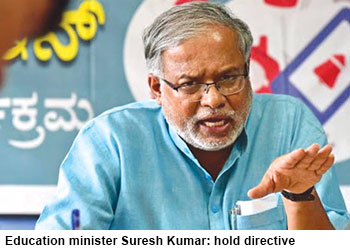 With Karnataka’s 49,855 government schools shuttered for five months following the outbreak of the Covid-19 pandemic, the state’s education ministry issued an order on July 25 directing the Karnataka Text Book Society (KTBS) to reduce the prescribed state board syllabus for the academic year 2020-21, which began in June, by 30 percent.
With Karnataka’s 49,855 government schools shuttered for five months following the outbreak of the Covid-19 pandemic, the state’s education ministry issued an order on July 25 directing the Karnataka Text Book Society (KTBS) to reduce the prescribed state board syllabus for the academic year 2020-21, which began in June, by 30 percent.
Addressing the media, KTBS director Made Gowda said the maximum syllabus reduction will be in literature, environment science and social science subjects. In particular, the chapters referring to the 18th century Anglo-Mysore wars (1767-1799) between the British and Mysore ruler Hyder Ali and subsequently his son Tipu Sultan, would be omitted from class VII and IX textbooks, he added.
This proposal has provoked a major outcry from the opposition Congress party and liberal academics of the state. In 2015, the state’s Congress government had celebrated the birth anniversary of Tipu Sultan positioning him as a great freedom fighter against British rule in the kingdom of Mysore (renamed Karnataka in 1973).
However, it’s pertinent to note that Hyder Ali and Tipu Sultan were Muslim rulers of the Mysore kingdom, and some historians have recounted horror stories of Tipu forcibly converting Hindus to Islam and conducting massive executions and torture of reluctant Hindu subjects especially in Coorg (Kodagu) district. This latter narrative has always been accepted by the right-wing Hindu majoritarian BJP which has been ruling the Centre since 2014 and is currently the ruling party in Karnataka (pop. 64 million). Therefore, the Congress party alleges that by citing pandemic-related compulsions for reducing the school syllabus, the ruling BJP has seized the opportunity to excise Muslim rulers Hyder Ali and Tipu Sultan, from school history textbooks.
Comments D.K. Shivakumar, president of KPCC (Karnataka Pradesh Congress Committee): “We cannot accept the BJP government rewriting history. Hyder Ali and Tipu are a part of Karnataka history and history cannot be changed.” However, Made Gowda refutes the charge saying the details of the 18th century Mysore rulers are included in class VI and X textbooks although proposed to be deleted in class VII and IX texts.
This contention is flatly contradicted by D. Shashikumar, general secretary of the Karnataka Associated Managements of English Medium Schools (KAMS, estb.1988) which has a membership of 2,000 affordable private schools statewide. “The social science textbooks of class VI and X do not contain chapters on Tipu Sultan. The government has taken advantage of the crisis to remove all references to Hyder Ali and Tipu Sultan because of its anti-Muslim bias. In fact, they were popular rulers of the Mysore region and staunch nationalists. That’s why previous governments rightly celebrated Tipu’s birth anniversary annually since 2015,” says Shashikumar.
Moreover according to him, apart from token reduction of politically selected portions, the syllabus has not been pruned. “The number of study periods has been reduced from 180 to 120. But children have to cover almost the entire syllabus. This will impose tremendous stress on teachers and pupils and damage learning outcomes,” he warns.
Against this backdrop, informed educators suggest syllabus pruning should be left to school managements. “It is necessary to cut the syllabus short for the truncated academic year as we have lost three months of the 2020-21 academic year already. It is advisable to reduce content in social sciences rather than maths and science because the latter are integrated subjects while history can be read any time later. Therefore, teachers are best judges of what should be excluded from prescribed syllabuses,” says Dr. M. Srinivasan, founder-principal of the CBSE-affiliated Gifted Education and Research (GEAR) Innovative International School (estb.1995), Bangalore.
Following the furore over excision of portions related to Hyder Ali and Tipu Sultan from textbooks, on July 29, education minister S. Suresh Kumar directed KTBS to put its decision on hold. Meanwhile, KTBS is still working on the class I-X syllabus reduction because of the forced closure of operations due to the pandemic. “We will soon submit our report to the minister and he will take a final call on the portions to be omitted this year,” says Made Gowda. But although KTBS officials have been debating the syllabus issue since May, there is still no clarity on the subject.
Unfortunately in all 29 states and seven Union territories, politicisation of education is a pervasive reality. And Karnataka is no exception.
Akhila Damodaran (Bangalore)
Also read: Karnataka: Battle won – online teaching
Posted in Education News

























